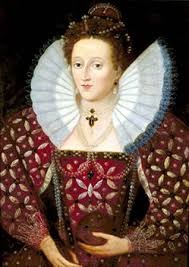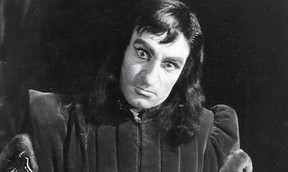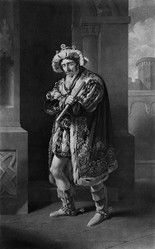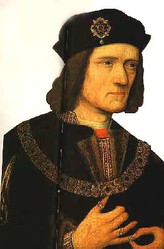 The very fact that Richard is a tragic hero is immensely fascinating to me.
The very fact that Richard is a tragic hero is immensely fascinating to me.
Shakespeare wrote the play while Elizabeth I was still on the throne. Elizabeth's grandfather, who would become Henry VII, deposed the 'evil' (at least according to the Tudor perception of things) Richard.
So, if you really want to impress your monarch, wouldn't you write a play in which her grandfather was the hero? Well, I suppose you could say Henry is a 'hero' of sorts, but he has a pretty small part, and Richard certainly (whether you feel he's a hero or villain) steals the show.
This, in itself, seems like an interesting way for Shakespeare to approach the history. Why did he choose to tell it from Richard's point of view? It could just be that dramatically it made for a better story. Or perhaps, because Richard was the boogeyman of Tudor England, he believed having him center stage would pull in the crowds.
Whatever the case may be, center stage Richard most certainly is and, like every tragic hero, he has a 'hamartia'; a chink in his armour; an Achilles heel which is going to result in his downfall.
Richard's tragic flaw is ambition, coupled with a blinding hatred toward the people he feels have wronged him - that includes anyone who has laughed at his appearance, the women who have never found him attractive, the much more handsome older brother: everyone.
Richard has a big ol' beef against the world...and what we have to ask ourselves is: can we blame him?
Leaving aside for one moment the truth about Richard's physique, there's no question that Shakespeare's Richard was never going to model for Michaelangelo. And he exists in a time when disability and deformity is looked upon as proof of evil.
Now, we could argue cause and effect, and clearly the Tudors believed that his outward appearance was evidence of him being rotten to the core. But what if it was the other way around? What if Shakespeare's Richard became a monster, because, from the moment he was born, he was treated like one.
This bitterness and resentment is an all too human flaw; one that we can perhaps understand. And it's a flaw that will cause Richard's downfall.


 Now, I know what you're thinking, Richard III isn't a tragedy, it's a history play; it comes under the history category in the complete works and it is, after all, based (at least to some extent) on actual events. Well, this is all very true.
Now, I know what you're thinking, Richard III isn't a tragedy, it's a history play; it comes under the history category in the complete works and it is, after all, based (at least to some extent) on actual events. Well, this is all very true.

 In order for a tragedy to be 'tragic', we have to feel at least some empathy with the hero.
In order for a tragedy to be 'tragic', we have to feel at least some empathy with the hero.
 The very fact that Richard is a tragic hero is immensely fascinating to me.
The very fact that Richard is a tragic hero is immensely fascinating to me.

 It's commonly thought that Shakespeare has a lot to answer for in perpetuating the notion of Richard III as a villain.
It's commonly thought that Shakespeare has a lot to answer for in perpetuating the notion of Richard III as a villain.




 How to Avoid College Debton 07/31/2014
How to Avoid College Debton 07/31/2014
 Was Charlotte Bronte Jealous of her Sister Anne?on 07/15/2014
Was Charlotte Bronte Jealous of her Sister Anne?on 07/15/2014
 Whose Side is Cancer Research UK on?on 07/06/2014
Whose Side is Cancer Research UK on?on 07/06/2014
 A Plot Summary of Electra by Sophocleson 07/05/2014
A Plot Summary of Electra by Sophocleson 07/05/2014



Comments